Stop taking co-codamol and see a doctor or go to a hospital straight away if:
- you get swelling of the hands, feet, ankles, face, lips or throat which may cause difficulty in swallowing or breathing, increased sweating, redness or flushed face, mucosal lesions (such as mouth ulcers), drug fever.
- If you notice an itchy, lumpy rash (hives) or nettle rash (urticaria). This may mean you are having an allergic reaction to co-codamol.
- You get a severe skin reaction, such as reddening of the skin with blisters or peeling and may be associated with a high fever and joint pain. There may also be severe blisters and bleeding in the lips, eyes, mouth, nose and genitals (Stevens-Johnson syndrome or toxic epidermal necrolysis). Or if you experience a red, scaly rash with bumps under the skin and blisters (acute generalised exanthematous pustulosis or fixed drug eruption).
- Severe stomach pain, which may reach through to your back. Tell your doctor or pharmacist if any of the following side effects gets serious or lasts longer than a few days:
- Constipation, feeling sick (nausea), being sick (vomiting).
- Dizziness, light-headedness, drowsiness, confusion.
- Pain and difficulty passing urine.
- You get infections or bruise more easily than usual.
- Other side effects:
- Gastrointestinal system - stomach irritation (mild stomach pain, heartburn and feeling sick), constipation, being sick, loss of appetite, dry mouth, difficulty in the passage of food through guts, abdominal pain and swelling (may be signs of liver damage or a swollen intestine).
- Heart - slow heart rate, palpitations, low blood pressure, inflammation of the heart muscle.
- Urinary system - a less frequent need to pass urine, kidney problems.
- Nervous system - mood changes, depression, hallucinations (seeing or hearing things that are not real), restlessness, excitation, fits, increased pressure in the skull (painful eyes, changes in vision or headache behind the eyes), headache, difficulty sleeping, nightmares, reduced alertness, tolerance (medicine has less effect) or dependence (suffer from withdrawal symptoms e.g. tremor, difficulty sleeping, sweating, increased heart rate, increased breathing rate, raised blood pressure and feeling or being sick if the medicine is stopped too quickly).
- Eyes - blurred or double vision, extremely small pupils.
- Reproducive system - lower abdominal pain (may be caused by spasms of the uterus).
- Others - trembling, unusual tiredness or weakness, general discomfort and illness, low body temperature.
500mg of paracetamol and 8mg of codeine phosphate.
- Co-codamol should be used at the lowest effective dose for the shortest period of time. This dose may be taken, up to 4 times a day at intervals of not less than 6 hours. Maximum daily dose should not exceed 8 tablets in any 24 hour period. Do not take continuously for more than 3 days without consulting your doctor.
- Adults and children aged 16 years to 18 years: 1-2 tablets which may be repeated every 6 hours.
- Children aged 12 years to 15 years: The recommended co-codamol dose for children 12-15 years should be 1 tablet which may be repeated every 6 hours when necessary up to a maximum dose of 4 tablets in any 24 hour period.
- Children aged less than 12 years: Co-codamol should not be used in children below the age of 12 years.
- If you are elderly and have a damaged liver your doctor will usually prescribe you a lower dose.
Do not take Co-codamol 8/500 tablets:
- if you are allergic to paracetamol, codeine phosphate or other opioids, or any of the other ingredients in this medicine (please see leaflet enclosed with your medicine).
- If you have diarrhoea caused by poisoning or severe bloody diarrhoea (pseudomembranous colitis).
- If you have difficulty breathing, or other chronic lung disease.
- If you are having an asthma attack.
- For pain relief in children and adolescents (0-18 years of age) after removal of their tonsils or adenoids due to obstructive sleep apnoea syndrome.
- If you know that you metabolise very rapidly codeine into morphine.
- If you are breastfeeding.
- Talk to your doctor or pharmacist before taking Co-codamol tablets if you have:
- liver or kidney problems.
- Diseased adrenal glands (Addison’s disease) or high blood pressure caused by a tumour near a kidney (phaeochromocytoma).
- Inflammatory bowel disease.
- Gall bladder disease or gall stones.
- Recently had surgery on your gastro-intestinal tract or urinary system.
- An enlarged prostate gland and have difficulty urinating and are male.
- Epilepsy or suffered head injury or raised pressure in the skull (may cause painful eyes, changes in vision or headache behind the eyes).
- An underactive thyroid gland.
- Muscle weakness (myasthenia gravis).
- Low blood pressure or are in shock.
- Suffered from alcoholism, drug abuse or dependence or mental illness.

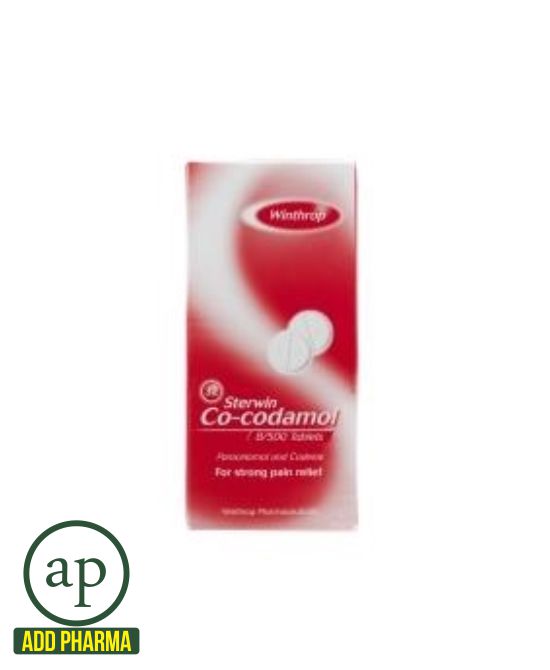

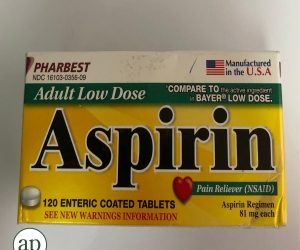
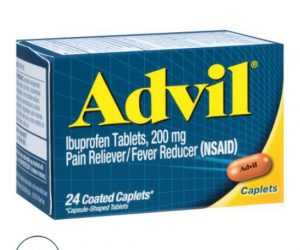
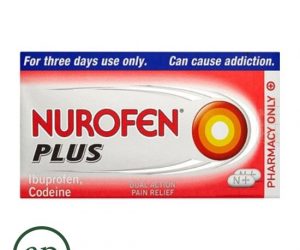
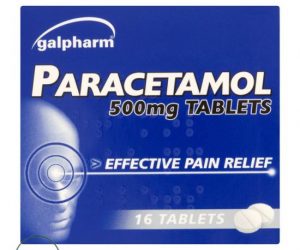

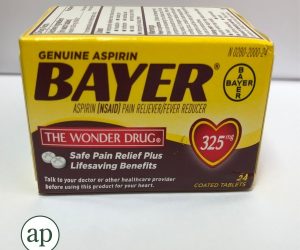

Reviews
There are no reviews yet.